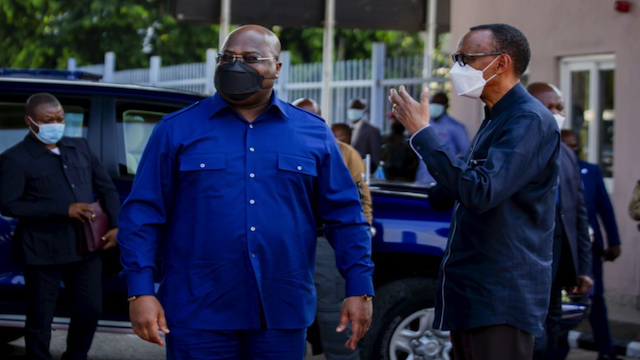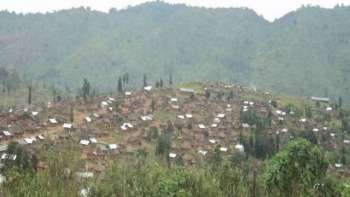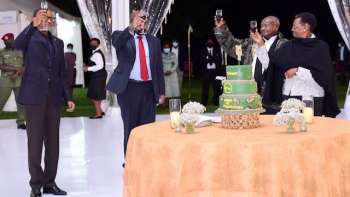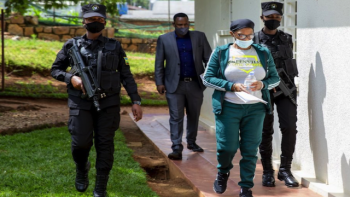On Saturday June 26, 2021, the presidents of the Democratic Republic of the Congo (DRC), Felix Tshisekedi and of Rwanda (DRC), Paul Kagame, signed a trade agreement in the town of Goma, in North Kivu Province, Eastern DRC. The trade agreement includes three pieces: exploitation of mineral resources, taxation, and securing investment infrastructures. The agreement has raised concerns and controversies, with some observers expressing their fears of the balkanization of the DRC.
The agreement was concluded more than one month after the eruption of the Nyiragongo volcano that caused destructions and a grave humanitarian crisis in both DRC and Rwanda.
The agreement also comes after President Felix Tshisekedi imposed a state of emergency, declared since last May 2021, in the provinces of North Kivu and Ituri, officially aimed at addressing the violence from national and foreign armed groups
Agreement on Exploitation of Gold Mines.
One of the pieces of the agreement is contained in a memorandum of understanding on the exploitation of gold mines. Two companies, the congolese Société Aurifère du Kivu et du Maniema, SARL (SAKIMA, SARL) and the Rwandan
DITHER, LTD will jointly exploit the Congolese gold mines. The mines will be processed in Rwanda, before being exported to other countries, especially in Middle East, Europe, America.
SAKIMA, a new name for Sominki following its restructuring, was a subsidiary of the the Canadian mining company Banro Resource Corporation. Banro Resource Corporation held 93% of SAKIMA capital, whereas the government of the DRC held the remaining 7%. In early 2000s, following tensions between the DRC Government and foreign investors, Banro was dispossessed of Sakima, but reacquired gold concessions and created four subsidiaries to exploit these concessions.
As recently as 2020, it was reported by The Extractive Industries Transparency Initiative (EITI) (see here) and Enough Project that the DRC Government holds 99% of the shares of Sakima.
It is believed that powerful people in Rwanda, mostly close or related to Paul Kagame, along with foreign investors are behind DITHER, Ltd
Advertisement
... ON AMAZON AND BARNES NOBLE-- CLICK HERE
For more on Legs of Tornado: The Human Who Outran the Wind, Visit the site Legs of Of Tornado, here
Promoting and Protecting of investments or Balkanization.
This is perhaps the most controversial piece in the agreement. According to AfroAmerica Network sources in Kinshasa, President Tshisekedi has agreed to let the Rwandan special forces officially enter the DRC, under the cover of protecting areas in which the mines exploited by Sakima SA and Dither, Ltd are located. With the agreements, Rwandan forces would be able to enter into DRC without fears of sanctions by the UN or other international organizations. Hence, the agreement has raised fears of the Balkanization of the DRC.
In fact, sources close to the president of the Democratic Republic of the Congo (DRC), Felix Tshisekedi, have told AfroAmerica Network that his closest aides have renewed their warnings against his collaboration with the Rwandan regime and his actions and statements that may be viewed by the Congolese people as signs of treason against the country and its institutions. The aides have pointed to past open statements and condemnations by various local, church, and national leaders of his invitation of Rwandan troops to conduct military operations in Kivu and Maniema provinces and the potential risks of the balkanization of the DRC.
The sources also reminded Felix Tshisekedi of his recent performance in Paris, during the France-Africa Summit hosted by French President Emmanuel Macron. During France-Africa Summit, Rwandan Paul Kagame denied the 2010 UN Mapping Report On Systematic Massacres of Congolese Civilians and Rwandan Refugees, despite more than 10 millions Congolese already killed in invasions and wars by Rwandan troops and Rwandan supported and funded militias.
When asked by the French media about Paul Kagame's denials, Felix Tshisekedi, under pressure, grudgingly addressed Paul Kagame's controversial statements by declaring himself ignorant of the crimes documented in UN Mapping Report and saying:
"I do not want to argue, I do not know what happened, you will need to ask the question [on the massacres, war crimes and genocides documented in UN Mapping Report] to President Kagame.""
In January 2020, President Felix Tshisekedi made a trip to Kigali, Rwanda, claiming to meet investors and convince them to invest the DRC.(see here: DR Congo: New President Felix Tshisekedi Facing Serious Dissensions Over Crisis in East and here: DR Congo: New President Felix Tshisekedi Already Showing Serious Shortcomings," Closest Aides Say)
In Rwanda, Felix Tshisekedi's first action was to write, during a visit to a genocide memorial site in Rwandan capital Kigali, that 6 millions congolese civilians killed by Rwandan troops in Eastern DRC between 1997 and 2003, were a collateral damage of interethnic massacres and genocide that happened in Rwandan in 1994 and led to more than 1 millon Rwandan killed, according to estimates.
After the visit to the memorial site, Felix Tshisekedi had a meeting with the Rwandan dictator Paul Kagame. According to the sources, during the meeting, Paul Kagame mentioned, that Felix Tshisekedi closest aides who recently visited Rwanda had requested that Rwanda send battalions in Eastern DRC to fight armed groups there.
"As I promised, I am ready to send 3 battalions. I think that, working with FARDC, they will be able to destroy, once for all, the foreign and local militias operating in North and South-Kivu. Trust me on this. I will send 3 battalions of the Rwandan special forces in Kivu. They will have the job done swiftly and cleanly, " Rwandan dictator Paul Kagame said.
The new agreement has now set the stage for the realisation of the proposition.
It is expected that the situation may worsen, as activists have started to accuse Felix Tshisekedi of not prioritizing the interests of the DRC.
@AfroAmerica Network 2021


















